|
"I literally felt torn in two pieces. I didn't want to leave one baby to go back to the hospital, but I couldn’t stay away from the baby still fighting in the NICU." 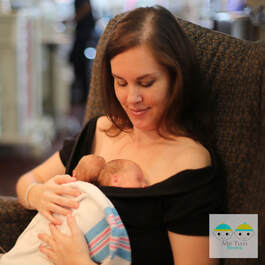 There are many things about the NICU that no one tells you. And when multiples are involved the unknowns double. From the moment my twins were born at 28 weeks and admitted to the NICU, my first thought in the morning and my last thought at night was when will they come home. But during the 55 days that my twins shared the NICU, it had never occurred to me, nor had I ever been told that they might not go home together. But that is exactly what happened. One of my twins was ready to be released, and the other was not. It would take another ten days before they would be reunited again. Those days were the hardest part of the whole NICU experience. I literally felt torn in two pieces. I didn't want to leave one baby to go back to the hospital, but I couldn’t stay away from the baby still fighting in the NICU. Finding a balance was impossible, which led me to feel so guilty. Dealing with multiple discharge dates for your NICU babies will be difficult, but here are a few things that could help. It is Common
It is common that multiples will have differing NICU stays in terms of treatment and length. Understanding and preparing for this from the beginning helps. Consider Childcare Have a plan in place for childcare. Once a baby is released from the NICU, they are not allowed back as a visitor. Future hospital visits will have to be made alone. Make sure you have someone in mind that can watch your baby at home that is comfortable providing the level of care that a medically fragile baby could need. Continue to Bond You may feel that you are less bonded, or are losing your bond with your hospitalized baby because you are not spending as much time with them as before. But the parental bond is based in quality not quantity. When you are able, continue all those bonding activities like kangaroo care, reading, and talking to them. And if you can't make it to the hospital everyday, remember that bonding can still take place via technologies like FaceTime and Zoom. Get Support Having one baby home from the hospital will likely cause a flood of emotions, from happiness to guilt. It is important to seek help and support from your friends, family, partner, and professionals during this time. When a preemie is born, so is a parent advocate. ~Ali Dunn, Me Two Books Having a preemie can make you feel helpless. The role you envisioned as a caretaker and parent, is not what you are experiencing. After my twins were born at 28 weeks, I wanted to do everything I could to help them get better. But I didn’t know how. I soon found my voice and learned that it was a very powerful tool. Here are a few ways you can use your voice as a preemie parent. To Advocate When a preemie is born, so is a parent advocate. Parents serve an important role on the care team. While it can be difficult at times, it is so important to advocate for your baby and share your thoughts and concerns. To Bond
Babies can recognize their mother’s voice at 22 weeks gestation. Hearing a familiar voice promotes attachment, produces a calming effect, and can counteract all the background noise from alarms and equipment. Talk or sing to your babies to help build a strong bond. To Relieve Pain New and continued research suggest that maternal speech decreases pain scores and increases oxytocin levels in preterm infants during painful procedures. Your voice can be a simple way to help your baby experience less pain. While it may not always feel this way, your voice is very powerful and can be used in many ways to help your premature baby. Be empowered! How do you use your voice? I just could not imagine that my tiny daughter who I loved so much, who had this larger than life spirit, was actually gone. I also knew that her spirit and her memory had to live on. ~Michelle Valiukenas, The Colette Louise Tisdahl Foundation I am excited to share my interview with Michelle from The Colette Louise Tisdahl Foundation. The work they are doing is amazing and much needed! Make sure you connect and support her foundation on Facebook, Instagram, LinkedIn, and Twitter. ~ Ali 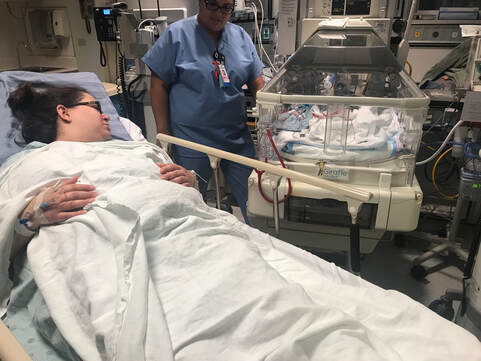 Tell us your story and how the Colette Louise Tisdahl Foundation began. My husband Mark and I struggled with infertility, ultimately going through IVF. We got pregnant on our first round of IVF and then subsequently miscarried weeks later. On our third round of IVF, we got pregnant with our daughter Colette. We were excited, nervous, and the pregnancy went along well (besides my constant all-day morning sickness). At 21 weeks pregnant, a standard OB appointment found my blood pressure at 188/110, a total shock to me since that day had been the first day I had felt really good during my pregnancy. My OB sent me to the hospital where I was admitted with a diagnosis of severe preeclampsia and told I would be in the hospital until I delivered. It felt like our whole world had turned upside down in an instant. It was early May, I was not due until September 7, and did not have the kind of leave from work that this stay required. It became obvious quickly that our two-income household was going down to one-income. I was blessed that we could sustain that financial blow, but could not help thinking of how many other families would be decimated by that, at a time when all the medical advice is to reduce stress. After being in the hospital for a day or two, I told my husband we have to do something about this problem. I spent a little over three weeks in the hospital before the doctors recommended delivery. Colette was born May 23, 2018 at 24 weeks and 5 days. The doctors and nurses all repeatedly told us that we would not hear her because she was too little to cry. But, when she entered the world and the doctors told us it was a girl, we then heard this tiny, but powerful squeak and I asked, was that her? Everyone was amazed and said, yeah, that was her. I knew then that this was of course my badass daughter who was going to change the world. Colette continued to defy all the odds for those first few days and while NICU was of course a roller coaster of yay she's doing so well, to oh, no, things aren't good, she had this spirit and energy that was so much bigger than what her tiny body could hold. After nine days in the NICU, Colette's tiny body gave out and we held her in our arms for the first time as she died. I was lost after Colette died, I just could not imagine that my tiny daughter who I loved so much, who had this larger than life spirit, was actually gone. I also knew that her spirit and her memory had to live on. In the midst of grief, I needed something to turn those emotions and energy into and created The Colette Louise Tisdahl Foundation. We launched on Colette's due date, September 7, 2018, and as of the end of February 2021, we have helped more than 550 families in 39 states, giving away more than $600,000 in assistance. What kind of impact do you hope that your organization can have? I hope that families going through crisis have just a little bit of relief and some of their many stresses are relieved. I also think that having had the experiences of infertility, pregnancy complications, NICU stays, and loss means I can relate to these families on a deeply personal level and therefore, can be a sounding board that understands what it is like to be a parent in these situations. On a greater, broader level, I hope that we can advocate for broad social change, to work with so many countless colleagues, friends, and like-minded strangers who do not accept the world as it is. Our work and the lives of so many families would be widely different if policies like paid family leave for all, subsidized childcare, better working schedules from employers and a society that respects and supports parents, were the norm and not the exception. I also think that if we truly confronted issues of racism, sexism, and classism in our institutions, particularly in the medical community, we would greatly change the world so that women and babies of color were not more at risk of complications, prematurity, severe medical conditions, or even death. What is the biggest concern facing your clients today? The biggest concern is survival. All of us as parents have challenges every day we are parenting, but for parents dealing with health concerns personally and/or for our children and for parents grieving their child's losses, it is even more difficult. When we add on the financial burdens that parents have as a result of the crisis, such as increased transportation costs, the need for medical equipment, for childcare, etc., along with loss of income either entirely or partially, these parents so often find themselves struggling on all fronts. 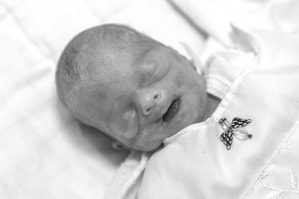 What inspires you to keep advocating for families in crisis? Colette. Every day, I parent her through this organization and as all moms know, we never have a day off from being a mom. I knew when I started this that I could not let Colette's life be in vain and that I did not want her story to be something whispered among those who knew of our loss and hidden from everyone else. Few things make me happier than the fact that so many families utter Colette's name every day and keep her name and her power of her memory and life close to their hearts. How can someone help support your mission and organization? We of course are always looking for financial assistance which allows us to help more families and to help families more deeply. If you are financially able, we would invite you to our website: www.colettelouise.com to join our mission and help families in crisis. Additionally, we learn so much from each other and our stories and experiences, so I would invite parents and providers to consider guest blogging or being interviewed by us. If interested, please email me at [email protected]. Finally, share what we post, what we do with others so that we all learn and support families in crisis. Originally published at handtohold.com But if the question you were really asking all along was if you were going to be able to make it through, the answer is an easy yes! I had changed many diapers before, but the first time I changed my own baby’s diaper was different. I needed a nurse to show me the process. With my hands inside an incubator, I had to work around wires and tubes. Everything was miniature, and I really had to concentrate to ensure I completed all the steps in the right order. I looked up at the nurse with a nervous smile and asked, “Does this get easier?”
It was Christmas Day, and I was sad to be at the NICU instead of spending my babies’ first Christmas at home with family. After a long scrub of my hands, I entered the NICU to hear today was bottle day. I was going to get to feed my baby a bottle for the first time. The nurse showed me how to hold my baby in an upright position, not in my arms like I had imagined. It felt awkward, and unnatural to me. The actual feeding didn’t go much better. There was sputtering and crying, and several minutes in I was sure more milk had been spilled than drank. I looked up at the nurse with a nervous smile and asked, “Does this get easier?” But I wasn’t really asking about simplicity. A life with twins, preemie twins at that, was not going to be straightforward and uncomplicated. I already knew that. The question of “does this get easier,” isn’t a question of ease... it’s a question of hope. From the moment my twins were born at 28 weeks and admitted to the NICU, my first thought in the morning and my last thought at night was when will they come home. The whole experience was so hard, that I just wanted it all to be over. I viewed discharge day as the end. I naively thought that once my babies were home, this whole “preemie thing” would be finished and things would get much easier. I think every NICU parent wants someone to tell them that everything will be fine. That once your baby is discharged from the hospital all the stress will dissipate and life will be just as it was before. That is certainly what I was hoping to hear. But no one can really answer that question for you. Life with a preemie is all about getting comfortable with the unknown. However, here are a few questions that I can answer... “Will I always feel this fear?” No, that immediate life and death fear will subside over time and be replaced with a fierce determination to protect your child. “Will I be the parent, advocate and caretaker my child deserves?” Yes, you will rise to the challenge. You are everything your child needs you to be, and when you get tired, which you will, you will ask for help. “Will my life ever be the way it was before the NICU?” Nope... you have changed forever, but for the better. Now that I am several years out from the NICU experience, I have a different understanding. I recognize how difficult raising a preemie can be. And for many, the NICU is just the beginning of so many brilliant, but also extremely difficult days. Some of which will be overwhelming and harder that you could have imagined. But I am no longer in search of easy, because that was never really the goal. Finding hope is so much more fulfilling! So if you are still wondering, does raising preemies get easier? Yes...and also no. But if the question you were really asking all along was if you were going to be able to make it through, the answer is an easy yes! If you have had a baby in the NICU for 1 day or 100 days, you understand the stress surrounding this experience. NICU time is often unexpected and traumatic. It’s hard to manage your day-to-day life when your every thought is preoccupied with worries about your fragile child. Taking care of yourself is the last thing on your mind when you have a baby in the NICU. But the old saying is true, if you don’t take care of yourself, you can’t take care of anyone else. While it may be difficult, it is necessary to prioritize yourself. Self-care doesn’t have to be time-consuming or expensive. Here are four simple ways to care for yourself while you have a baby in the NICU.
Take a Break Long days spent in the NICU are both physically and emotionally taxing. Even if you are not able to be there every day, the time you spend at the hospital is very intense. Schedule time in your day to take a break. A walk around another hospital floor or a quick trip outdoors to sit in the fresh air will do wonders for your stress level. Rethink Your Reading Material One of my favorite things to do while my babies were in the NICU was read to them. I found it very relaxing, and a mutually beneficial way to spend our time together. In fact, studies show that reading to babies in the NICU reduces stress and aids in brain development. But just because you are reading to a baby, doesn’t mean you have to read children’s books all the time. Feel free to indulge in the latest best-seller, that both you and your baby can enjoy. Grant Yourself Permission to Take Time Away I always felt guilty spending free time doing something for myself when my babies were in the NICU. I felt that all my free time should be spent at the hospital. But I am here to tell you, I was wrong. Your baby is safe and well taken care of at the hospital. You can take an hour to chat with a friend or grab lunch with your partner. These things take little time, but make a huge difference in your emotional well-being, which in turn benefits your baby. Multi-Task While You Pump Pumping bedside may give you the best breastmilk yields, but sometimes it is nice to escape from the beeps and buzzes of the NICU. If there is an alternative pumping space, use it periodically. You are already doing something wonderful for your baby by pumping in the first place, so why not multi-task and do something for yourself at the same time. Listen to a podcast that you find entertaining or stream a TV show or movie that you enjoy while you pump. While nothing can take the stress of a NICU stay away, taking care of yourself can reduce it. Self-care may seem unnecessary or even indulgent at times, but it is so important. The NICU experience is a roller coaster, but you will be able to survive the ride if you spend a little bit of time on yourself. originally published on grahamsfoundation.com There were 5 or 6 of us huddled on the sidewalk that circles the park. It was 50 degrees and sunny, and we had all decided to meet at the playground as this kind of weather in the middle of January is too good to let pass without some time outside. I had met these other mothers before, but we were all just beginning to learn about each other. No one knew my story, because I hadn’t shared it yet. The conversation turned to childbirth, and I began to feel a little anxious. I tried not to make eye contact with anyone...and then it happened. Someone asked me if I had an epidural when my twins were born. In my mind, I quickly weighed the options. Tell the truth and risk taking the conversation down a depressing road, or tell a lie. These types of questions just make me uneasy. I understand that the person asking them is just trying to include me in the conversation, but I always feel like I’m put in an awkward place. I decide to go for the truth. I responded that I actually had a spinal block because I needed an emergency c-section at 28 weeks. The laughter and chatter of the group paused, someone said I’m sorry and then the topic of conversation changed.
Several days later, I was sitting in the designated parents’ area, waiting to retrieve my kids from their daily activities. A small group of moms were standing around a woman who was clearly very pregnant. She was describing her discomfort and commiserating with the other ladies gathered there. As I approached I heard them comparing end of pregnancy symptoms and I almost turned around and headed the other way. But it was too late and I had already been brought into the conversation. In my head, I was thinking that I would have loved to have made it to the uncomfortable phase of pregnancy. That no physical discomfort can compare to the emotional anguish that having a baby in the NICU brings. But I won’t say anything, not today. It can be very hard to share your story with people that haven’t lived through the NICU. I want to be brave and open up about what my family went through, because I know it helps others. But my experiences are often met with sadness and pity. It can change the mood of a conversation from humorous and fun, to depressing with a simple mention of the NICU. And while that is understandable, that is not how I view the birth of my preemie twins at all. From the outside, it’s often difficult to imagine the beauty and wonder that watching a tiny baby fight for their lives can bring. A journey that has provided me with the invaluable gift of perspective and gratefulness. My story and all NICU stories are the ultimate tales of hope and triumph over adversity. And these stories make a difference to new preemie parents everywhere, who are entering NICUs for the first time. So while it might be difficult to share please remember that the messenger matters, and your story can only be told by you. "And a gift is a gift, no matter how it is wrapped." Oh 2020...what a dumpster fire of a year you have been! In the remaining weeks that are left of this very memorable year, I can only imagine what will happen next. Has the whole year been bad...no. Has the whole year been hard...no. But there have sure been a lot of really bad, really hard hours, days, and even weeks. I never dreamed I would be living and parenting through a global pandemic, and yet here I am.
If you are a “big things parent,” it was an especially hard year. “Big things parents” thrive on creating memories through milestones and experiences. So when many big life moments, like graduations, vacations, and holiday celebrations were canceled this year, many parents felt defeated. They are passionate about celebrating the exceptional, and bringing joy to themselves and their families by throwing a special party, or planning a dream vacation. “Big thing parents” appreciate the destination. This makes for a rough year when you literally have no where to go. On the other hand, “small things parents” are here for the minutiae. They can appreciate the wonder that exists in the everyday. They can see something remarkable, in what appears quite unremarkable to others. “Small things parents” celebrate bare baby feet in green spring grass, snuggling under a blanket to read out loud (again) a favorite book, or flour handprints left from baking on the kitchen counter. They elevate the journey that is parenting. And while this year was hard for everyone, “small things” can be done daily...even in a pandemic. This year I was reminded that I can and should be both a “big things” and a “small things” parent. In fact, I started out as a “small things parent.” When you have a NICU baby, you quickly learn about the beauty that is simplicity. Milestones in the NICU are measured in grams and milliliters. So if you are not naturally a person who notices and celebrates the smallest of victories, you soon will become one. Typically, I take the time at the end of a year to reflect upon my accomplishments, and set new intentions for the upcoming year. Since I can’t begin to envision what the future will look like, I’m going to just focus on the past for now. I don’t want to dwell on the pain of 2020, so perhaps I can look at the positives. This year gave me the gift of time that allowed me to remember that sometimes less is more. And a gift is a gift, no matter how it is wrapped. This article was originally published at www.handtohold.org My preemies’ first “outfit” was not a family heirloom or a super cozy sleeper. It wasn’t even something that I picked out.
The first thing that my babies wore were tiny knitted hats of soft pastel yarn that had to be handmade by a volunteer because their heads were too small to fit store-bought hats. A hat was the only thing my babies could wear for weeks after their birth. Something that I didn’t realize before my twins were born at 28 weeks and admitted to the hospital, was that babies in the NICU do not wear clothes. The sickest and smallest of babies are only in specially designed preemie diapers, the tiniest diapers you can even imagine, that are still too big for some. They don’t need clothing for warmth, as they are in a climate-controlled incubator. The clothing only gets in the way of the leads, wires, and tubes that are necessary to keep these little ones alive. Seeing my bare babies was another reminder of how this wasn’t typical. It was a visual cue that I was not a normal parent, and I couldn’t do the very basic task of dressing my babies. Before our NICU experience, I never thought my babies’ first piece of clothing would be considered a milestone. I had thought about finding a special outfit for leaving the hospital. But I never thought I would be so emotional over a tiny white cotton button-up sleeper until the day I arrived at the NICU and saw my babies in clothing for the first time. When a NICU baby is finally allowed to wear clothes, it is a big deal! It meant that they were getting better, growing, and requiring less medical intervention. It meant that I would be able to change their clothes, and for a brief moment, I would feel like a normal parent. I could momentarily forget about the wires and tubes, the monitors and machines, and just enjoy this nurturing moment with my child. Years later, I still have the tiny preemie clothes that my kids wore in the NICU. I keep thinking that I should donate them, but I just can’t bring myself to do it. They are so much more than sleepers and onesies, they are a symbol of all my family has been through. And it’s not just those preemie clothes that are special to me. Anytime they grow out of a pair of jeans or size up in a new shirt, I’m reminded how far they have come and how much they have accomplished just by being alive. There are certain milestones that every parent dreams about, like the day their child starts walking or says their first word. But if you are the parent of a NICU baby, you quickly learn about a whole new set of milestones that you never even knew existed. Milestones in the NICU are measured in grams and milliliters. So if you are not naturally a person who notices and celebrates the smallest of victories, you soon will become one. A NICU baby has a lot of milestones to conquer well before the first steps are even considered. And while drinking their first bottle or wearing clothes for the first time might not seem like something special, for NICU babies, these accomplishments are sure something to celebrate. While it is impossible to prepare emotionally for having a baby in the NICU, at the very least, you can feel that you have what you need to make it through each day. I never packed an overnight bag for the birth of my babies. At 27 weeks, I was put on unexpected bedrest and spent the next 8 days at the hospital. I was admitted after a routine OB appointment, so I didn’t have time to collect items that would have made my stay more bearable. On the 8th day, my twins were born prematurely and taken to the NICU where they stayed for the next 2 months. During that time, I developed an all-day everyday NICU routine. The hospital that was caring for my babies had a “traditional” NICU that didn’t allow for a private room or space for parents to stay the night. It became a daily task to pack a bag with the things I would need to survive the day at the NICU. Here was what helped me care for myself and my babies during this time.
Loose-Fitting Clothes Life in the NICU was stressful, so I made sure my outfit was not. Comfortable pants that didn’t rub against my c-section scar were a must. I also wore oversized shirts or tops that could be unbuttoned to facilitate kangaroo care and frequent pumping sessions. I always wore freshly laundered clothes to help prevent the spread of germs to the NICU. Journal/ Notebook There is a lot of important information to keep track of in the NICU. I had a small notebook that I used to jot down questions I wanted to ask the health care staff. I also used this book to record my babies’ milestones and accomplishments. There are also several organizations that make journals specifically for the NICU experience that are great to have around. Camera The birth of my twins certainly didn’t go as I had expected, but these were still memories that I wanted to remember. I used my phone to snap photos, and occasionally I would bring my DSLR camera into the NICU as well. I guarantee you will be so happy to have those photos to look back on. Food/ Water As a pumping mama, I needed a constant supply of food and water. I didn’t want to leave the floor to go to the cafeteria, and sugary snacks from the vending machine left me unsatisfied. I packed healthier snack options and lots of water. Toiletries After hours at the hospital, I sometimes felt disheveled. At those times, I really appreciated having a small bag of toiletry items like a comb, toothbrush, and facial wipes. I also always needed chapstick. The hospital air can be extremely drying. Pumping Supplies When I was pumping, I never left the house without my supplies. The hospital provided a pump, but I needed to bring everything else like an insulated bag, a hands-free bra, and my pump parts (valves, flanges, connectors, etc.). I often needed to pump multiple times while at the hospital, so having cleaning wipes formulated especially to clean pump parts were useful. Book/ Entertainment One of the ways I passed the time at the bedside was by reading to my babies. On days when I was unable to hold them, it was nice to be able to strengthen our bond by reading. It also was a nice distraction from the stressors of the NICU. While it is impossible to prepare emotionally for having a baby in the NICU, at the very least, you can feel that you have what you need to make it through each day. I'm so excited to share my interview with fellow preemie parent Jamie C. Johnson with you on her book launch day! You can find her book Strong Faith: Daily Encouragement for Moms and Families of Premature Babies on Amazon. -Ali "As a result of my NICU experience I have become an advocate. I am on a mission to learn about preemie statistics, resources, etc., more specifically around families of color." ~ Jamie C. Johnson Please share your NICU journey. I gave birth to my son Caleb on September 28, 2018 via emergency c-section. He was delivered at 32 weeks, weighing 4lbs 0.4oz. He stayed in the NICU for 49 days. Caleb is my first child. I dealt with a rollercoaster of emotions as I had no one to talk to about the preemie/NICU experience. Caleb had his ups and downs with weight, his heart rate & his breathing. It was hard to find a way to feed him and he not have an alarm. I had a difficult time producing milk which was a major blow to my esteem as a mother. I felt pressure and guilt from the nurses as they kept asking about when I was bringing milk or when I did give milk "oh, is that all?" Having to resort to formula was painful. We are vegetarians and we planned to keep things as natural/organic as possible. Caleb had reflux and would vomit during many feedings. We tried several bottles & nipples. One of the nurses that I absolutely loved shared how some babies responded positively to "thickened feeds" (adding oatmeal to milk). I asked repeatedly to try it and my request was denied. I followed the NICU team's suggestions but I knew it wasn't working. When I told a nurse that it didn't work because Caleb was having bad alarms with me (which he rarely had) I was told that the head of the unit needed to see it not working for herself- which meant more alarms. I felt like they actually wanted him to have alarms. I was so angry that I wasn't respected as a mother. It took having a meeting with the head of the unit for my request to add oatmeal to Caleb's formula to be approved. Once we started it the alarms stopped and he began to gain weight more consistently. The unresolved feeding issue was what kept Caleb from coming home. He passed all of his tests that were necessary for him to be released. He just needed 3 consecutive days of no alarms. To think that not being listened to as a parent not only delayed my son from coming home but also contributed to the many times his heart rate dropped and his breathing slowed is heart breaking. What gave you strength while going through the NICU experience? God was my main source! I prayed so much throughout our NICU journey-believing that Caleb would come home and not have to stay until his original due date. Joshua, my husband was such a rock. He was working the night shift at that time and sacrificed his sleep to ensure I could get to the hospital everyday (I was medically not allowed to drive most of the time as I healed from my c-section). My family & friends were great as well. They held me accountable when needed and even allowed me and supported me during my low days. My mom only missed 1 day at the hospital with me. I found a song that ministered to me and kept me encouraged. I played it in Caleb's room everyday. I also found a book about an amazing boy named Caleb and read that to my Caleb everyday. I am grateful for technology! Being able to FT family and friends made quiet/lonely times conquerable. Tell us about your organization, Build You Up Sisters. Build You Up Sisters was created to provide opportunities for mothers of all walks of life from around the world to connect and support one another through love and sisterhood. We believe in the power of shared experiences to: foster Trust; give Encouragement; develop Relationships; and provide Support. The need for the sisterhood was noticed when our founder, Jamie Johnson became a mother to her amazing son who was born prematurely and was hospitalized for over 40 days. The many experiences she had led her to wonder about those that may not be as fortunate to have the support she did and the desire to connect and support mothers like her. BYU Sisters will soon have a cohort program to help moms become mompreneurs so that they can be financial contributors to their family while being active in their children's lives/education. What inspired your new book? While in the NICU I tried to find a book to help me through the process. I couldn't find anything that I could connect to. One day while spending time with Caleb I heard that I would write the book that I was looking for. From then I began writing out our experience and what I did to make it through as a mom of a premature baby. |

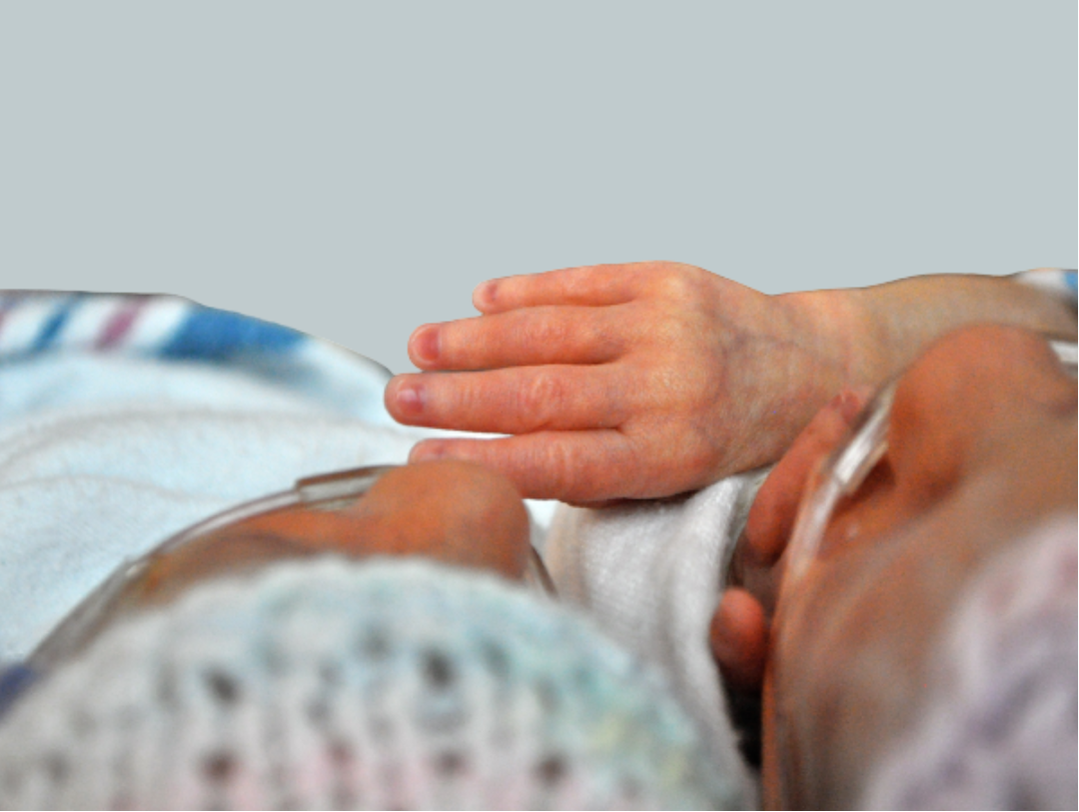
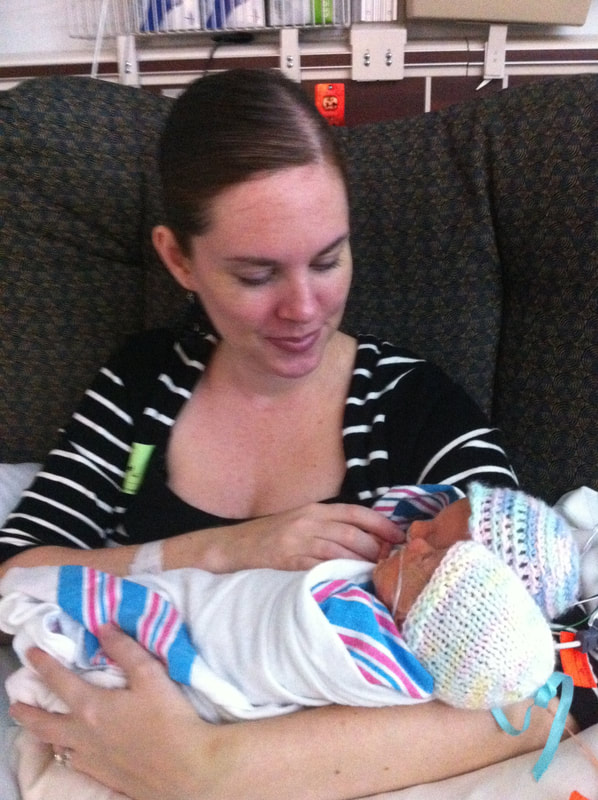
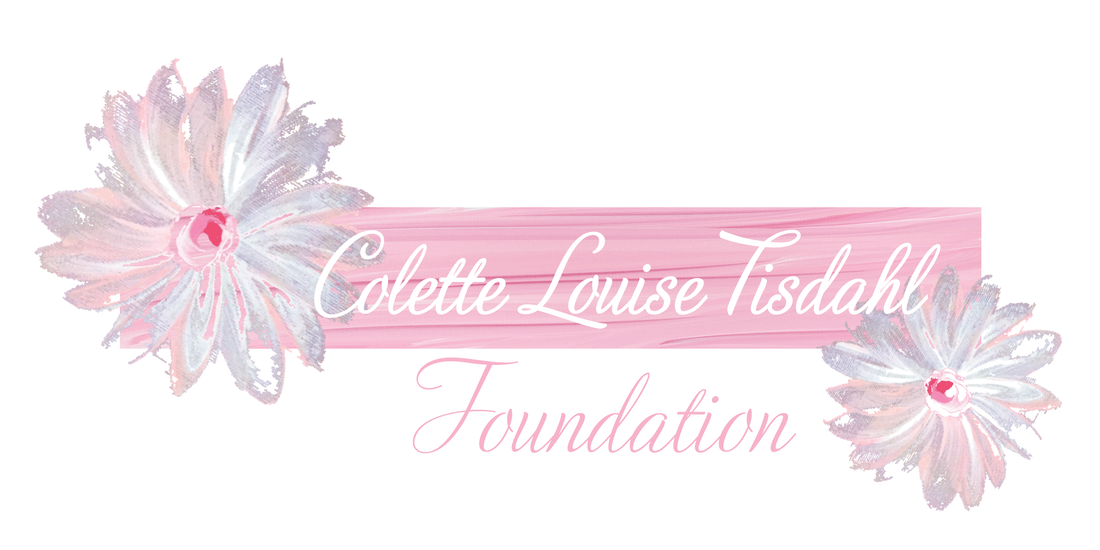
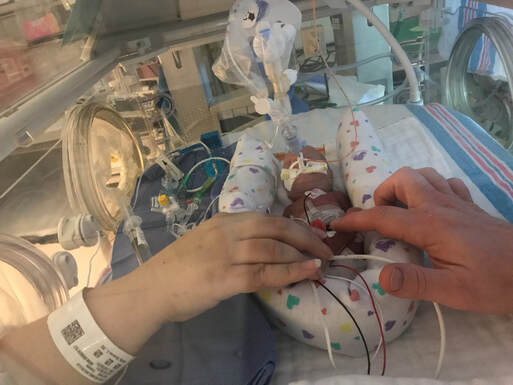
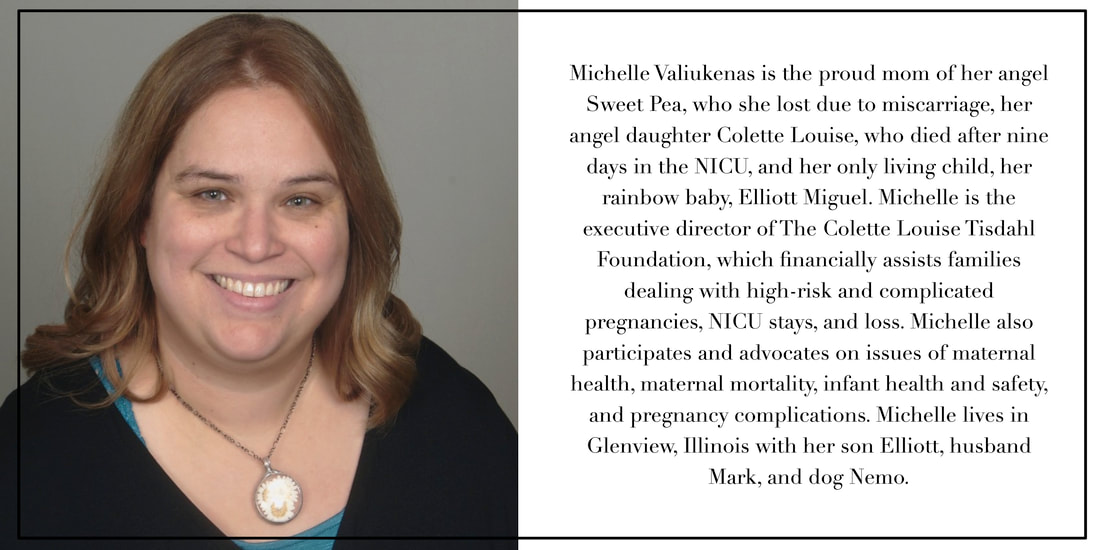
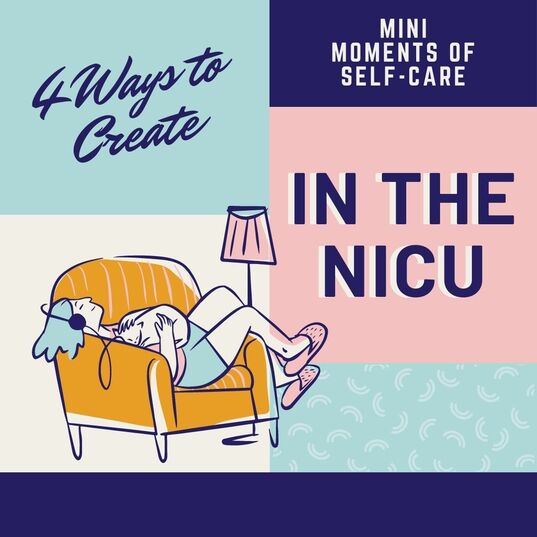

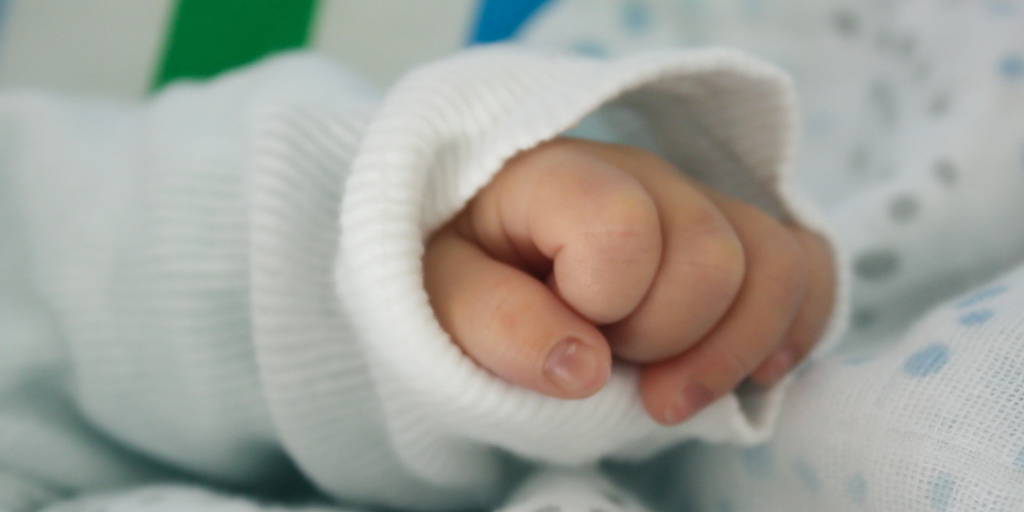
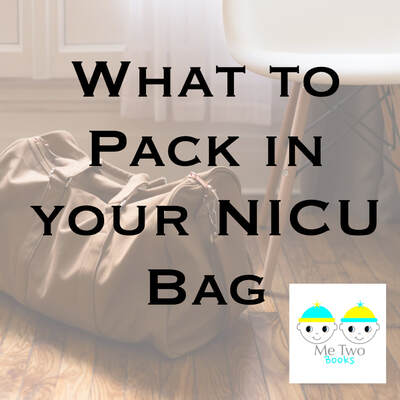

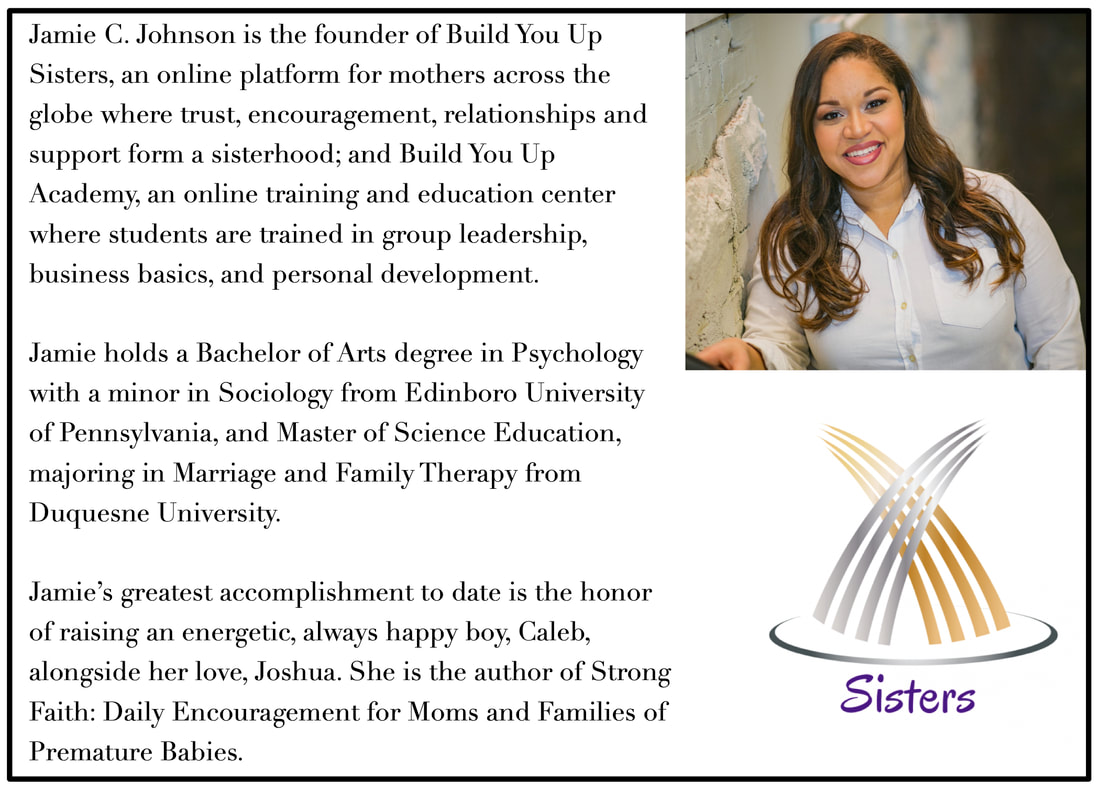
 RSS Feed
RSS Feed